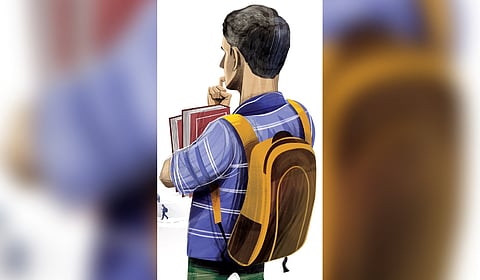

CHENNAI: The State Education Policy (SEP) focuses strongly on controlling the privatisation and commercialisation of higher education and has recommended the state government several measures to the effect.
Contrary to the National Education Policy (NEP) which provides private and public educational institutions equal footing, the SEP recommends the state government to take strict measures to control and streamline private higher educational institutions (HEIs). The SEP is also against any form of entrance tests for admissions into higher education courses, and bats for class 11 and 12 board exams marks to be made the basis for enrolment.
The SEP has also proposed that a regulatory body for ‘deemed to be universities’ should be put in place. It should have the power to regulate the admission procedure, including the admission of a fixed percentage of the total intake of students from Tamil Nadu, fee structure that may be determined by the fee committee, emolument structures for teaching and non-teaching staff as decided by the state. Importantly, it has recommended that deemed to be universities should also be made to adopt the reservation policy of the state.
Government participation in higher education is less compared to private participation, the SEP notes. As such, to stop privatisation and commercialisation of higher education, the government should invest more and establish new comprehensive institutions throughout TN, it adds.
The SEP has said that complete autonomy shall not be granted to institutions on administrative and financial matters until they attain a reasonable level of integrity, attitude, maturity and capacity.
Stating that the current three-year UG and two-year PG programmes should continue, the SEP has also allowed for a four-year bachelor’s programme (honours with research) for research purposes. It also opposes the multiple entry, multiple exit option of UGC and its idea of opening foreign universities in the state.
Moreover, the SEP also speaks on in reforms to the examination and assessment process, and highlights the need to make amendments in the Tamil Nadu State Council for Higher Education Act and strengthen it as a consortium of universities in the state.
The SEP has further proposed that upgrading the Tamil Nadu Dr M G R Medical University to a Centre of Excellence (CoE) must be given utmost priority. It also urges for revamping the existing scheme of vocational education.
Other key recommendations
Medium of education should be Tamil from primary education to university. A dedicated research wing on teaching and learning Tamil should be set up
Curriculum should focus on linking education to daily life and should promote autonomous learning
As far as pedagogy is concerned, instruction should be sensitive to prior and current learning needs of learners, which may diverge from expected grade-level outcomes
Art should be integrated into school learning and not just treated as extracurricular
Availability of playgrounds at schools should become a non-negotiable norm for any new facility
To encourage technology in education, the state should consider setting up the following frameworks and institutions: a state digital education content framework, state cloud platform for schools and colleges, state online hub for resource sharing and an advanced institute for information and communication technology
Schools should democratise their spaces to foster critical thinking
Adult literacy centres with online and offline resources should be in set up in every panchayat
A convergent task force should ensure educational opportunities and social support for children with special needs (CwSN), integrating early disability identification and rehabilitation into the education system. Inclusive infrastructure should be mandated in schools
Gender equality should be integrated into the curriculum and also teacher education
Each school should appoint a trained member, such as an SMC member, teacher, or social worker, to oversee substance abuse prevention and cessation
Extend benefits such as free bicycles to students from class 9 to 12
Aided schools must be treated on par with government schools and a study must be conducted to assess various problems faced by them, including posting of excess teachers, unregulated fee collection and fake portrayal of students’ strength